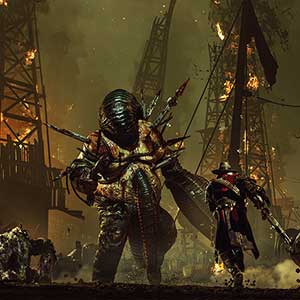

Worse still, the game doesn’t make clear which areas lock you in and which let you backtrack. With the exception of one mission, you’re never given freedom in how you want to explore the world. If they decide that you can airily hop between rocks to reach a dangling chain, your character will play the canned animation that does that. Like a game from the Xbox 360 generation, designers expect you to move around those levels in a specific way: if they say you can’t step over this log, you won’t be able to. Though level layouts aren’t always predictable, how you navigate through them is. When you finish watching a cutscene, you’re thrown into restrictive levels made up of clear encounter areas, quiet zones where you’re left to look for collectibles, and the occasional puzzle standing between you and getting to either of those two areas. This is where Evil West at its best, and worst.

If you’re okay with vampires existing, you’re probably going to be fine with electrical-infused gauntlets and railgun upgrades for your lever-action rifle.Įvil West plays really well in short sessions, but bigger problems arise the longer you play it. It also allows for a lot of liberty with the technology, in-world. That setup only really exists as a justification for introducing a range of monsters that you get to fight using era-appropriate weapons – it could have just easily been zombies or aliens. It’s a silly game, and it knows it, often revelling in its love for man-on-monster violence. Set in an alternate version of America’s wild west frontier lands, the story follows a secretive vampire-hunting order that has been dealing with an evolving threat for generations, while the government covers up their discoveries as viral outbreaks. Evil West is an old-school action game that blends melee combat with firearms a hybrid you don’t often see in the modern era. I thought about that interview as I played Evil West, the new game from the shooter masters at Polish studio, Flying Wild Hog.

Their impassionate pleadings question the need for violence, but they’re met with a ridiculing, frustrated: “Because it’s so much fun, Jan. There’s an early 2000s interview with director Quentin Tarantino in which a conservative pundit berates him about the level of gruesome violence in his movies.


 0 kommentar(er)
0 kommentar(er)
